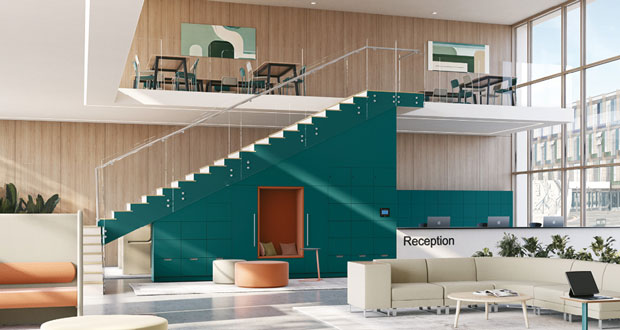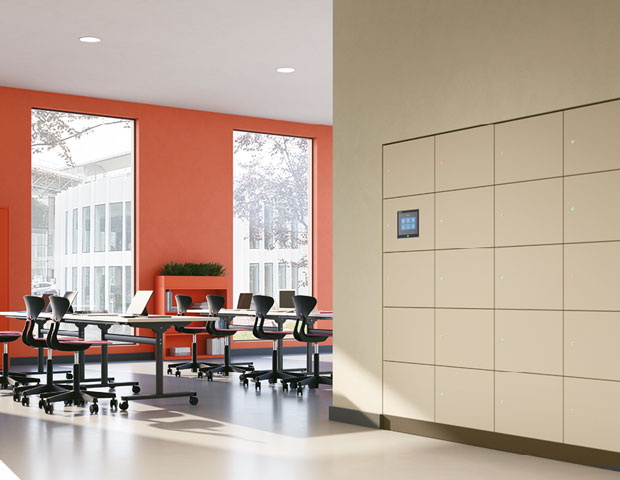Graeme Matthews, Sales Director at Bisley offers advice on storage solutions designed to meet the needs of both the hybrid workforce and the dynamic workplace
As workplaces continue to embrace hybrid working models, the demand for flexible and efficient office spaces has reached new heights. With employees now splitting their time between the office and remote locations comes a need for smarter solutions to manage office storage. Traditional, static storage systems no longer meet the needs of modern, dynamic work environments.
Smart storage solutions can revolutionise the way businesses approach storage in the workplace by integrating real-time data, multi-purpose lockers, self-service technology, and more, providing a solution that is as flexible as the hybrid workforce itself.
THE PROBLEM WITH TRADITIONAL STORAGE
In traditional office settings, storage is often static, with personal lockers, cabinets, and filing systems assigned to employees or departments. This method works well when the office is organised in a fixed and predictable way, but with hybrid working, this approach leads to several inefficiencies. For instance, fixed storage units often take up valuable space, especially in offices where attendance fluctuates, and lockers are underutilised.
Employees now tend to work across various shifts and locations, meaning their storage needs change day-to-day. A static storage system that allocates fixed lockers and storage belonging to employees who may not even be in the office that day only results in wasted space. Businesses are increasingly realising that traditional storage cannot keep up with the dynamic, ever-changing demands of hybrid work.
LIVE DATA TO RIGHT-SIZE STORAGE
Look for storage systems that use live data to optimise storage use. By leveraging real-time data, facilities teams can monitor locker usage and identify exactly how often lockers are used, who uses them, and for how long. This data-driven insight allows businesses to provide only the storage they truly need, ensuring that space is utilised efficiently.
Rather than overestimating storage requirements and allocating lockers based on assumptions, this approach helps reduce overprovision and eliminates the need for rows of empty lockers taking up valuable floor space.
MULTI-PURPOSE LOCKERS
In hybrid workplaces, flexibility is key, for example our BeSmart lockers are designed to work harder than traditional storage systems. Multi-functional lockers combine personal storage with the ability to handle other office tasks, such as parcel deliveries, IT equipment handovers, and more. This reduces the need for separate storage furniture and provides efficient solutions.
This type of locker can serve as a personal storage space for employees, but it can also double as a delivery station for parcels or a secure location to store IT equipment. This multi-purpose capability allows businesses to make better use of their office space, especially in hybrid environments where employees’ attendance and storage needs fluctuate daily.
SELF-SERVICE FLEXIBILITY FOR HYBRID TEAMS
With the rise of hybrid work, fixed personal lockers and assigned desks are no longer practical. Self-service technology allows employees to book and manage their lockers via smartphone app or RFID. This eliminates the need for employees to have fixed personal storage with manual keys, which often need replacing regularly across a workforce, becoming costly to the business and allows for flexible, shared use across different shifts and teams.
Employees can book lockers when they need them, select lockers across different floors, and manage their storage based on their daily activities. This flexibility allows businesses to make better use of every locker, ensuring that storage resources are always available when needed, regardless of the time of day or which team members are on-site.
Instead of cluttering up desks with personal items, employees can use lockers to store their belongings securely during the workday. This system not only supports flexibility but also keeps workspaces clear and organised, ensuring that employees can focus on their tasks without the distractions of excess personal items or clutter. Providing storage only when it is needed helps businesses maintain a clean, efficient, and agile work environment.
DATA-DRIVEN SPACE PLANNING
The latest smart locker solutions can gather detailed data on storage usage, providing valuable usage reports that show exactly where demand is highest and lowest within the office. This data can guide facilities teams in strategically placing lockers, ensuring that storage is concentrated where it is most needed and preventing unnecessary overprovision in low-traffic areas.
For instance, if data shows that certain locker zones are consistently underutilised, businesses can repurpose these areas for more productive uses, such as additional collaboration spaces or meeting rooms. Conversely, if there is high demand in specific areas, facilities teams can redistribute storage resources to meet those needs. This data-driven approach to space planning helps businesses optimise their office layout, improving the overall efficiency and functionality of the workspace.
PREVENTING OVER-PROVISION
One of the challenges businesses face when designing new office spaces is predicting storage requirements. In the past, many companies overestimated their storage needs during the fit-out stage, resulting in excessive storage units that took up valuable office space. FMs can address this issue by starting with a smaller storage solution and scaling up as needed.
By using real-time data to monitor storage usage FMs can expand their lockers gradually, ensuring that they only allocate additional space when it is truly necessary. This not only saves on real estate costs but also ensures that storage is always aligned with actual demand, keeping office spaces flexible and cost-effective.
SUSTAINABILITY BENEFITS
Sustainability is a growing priority for many businesses, and smart lockers help support these efforts by reducing redundant storage and promoting smarter reuse of existing furniture. Consolidating storage functions and enabling more efficient use of office space reduces the need for unnecessary manufacturing and excess storage furniture. This approach supports a more circular, sustainable office design, where resources are used more efficiently, and waste is minimised.
Smart lockers enable businesses to right-size their storage, reduce unnecessary space allocation, and prevent overprovisioning. With data-driven insights and the ability to reconfigure storage as needed, they offer organisations a smarter, more sustainable approach to office design.






